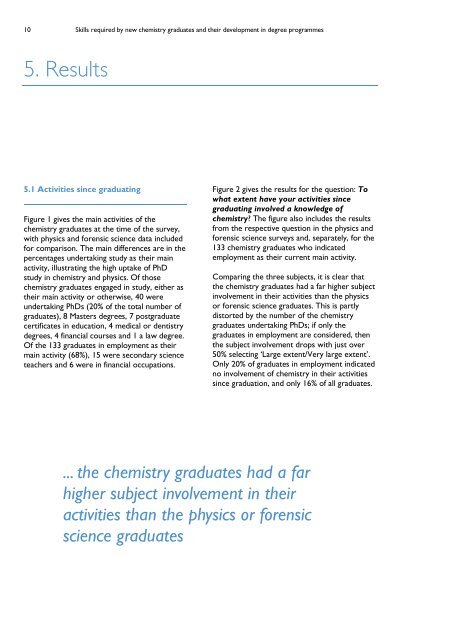Skills required by new chemistry graduates - Higher Education ...
Skills required by new chemistry graduates - Higher Education ...
Skills required by new chemistry graduates - Higher Education ...
Create successful ePaper yourself
Turn your PDF publications into a flip-book with our unique Google optimized e-Paper software.
10 <strong>Skills</strong> <strong>required</strong> <strong>by</strong> <strong>new</strong> <strong>chemistry</strong> <strong>graduates</strong> and their development in degree programmes<br />
5. Results<br />
5.1 Activities since graduating<br />
Figure 1 gives the main activities of the<br />
<strong>chemistry</strong> <strong>graduates</strong> at the time of the survey,<br />
with physics and forensic science data included<br />
for comparison. The main differences are in the<br />
percentages undertaking study as their main<br />
activity, illustrating the high uptake of PhD<br />
study in <strong>chemistry</strong> and physics. Of those<br />
<strong>chemistry</strong> <strong>graduates</strong> engaged in study, either as<br />
their main activity or otherwise, 40 were<br />
undertaking PhDs (20% of the total number of<br />
<strong>graduates</strong>), 8 Masters degrees, 7 postgraduate<br />
certificates in education, 4 medical or dentistry<br />
degrees, 4 financial courses and 1 a law degree.<br />
Of the 133 <strong>graduates</strong> in employment as their<br />
main activity (68%), 15 were secondary science<br />
teachers and 6 were in financial occupations.<br />
Figure 2 gives the results for the question: To<br />
what extent have your activities since<br />
graduating involved a knowledge of<br />
<strong>chemistry</strong>? The figure also includes the results<br />
from the respective question in the physics and<br />
forensic science surveys and, separately, for the<br />
133 <strong>chemistry</strong> <strong>graduates</strong> who indicated<br />
employment as their current main activity.<br />
Comparing the three subjects, it is clear that<br />
the <strong>chemistry</strong> <strong>graduates</strong> had a far higher subject<br />
involvement in their activities than the physics<br />
or forensic science <strong>graduates</strong>. This is partly<br />
distorted <strong>by</strong> the number of the <strong>chemistry</strong><br />
<strong>graduates</strong> undertaking PhDs; if only the<br />
<strong>graduates</strong> in employment are considered, then<br />
the subject involvement drops with just over<br />
50% selecting ‘Large extent/Very large extent’.<br />
Only 20% of <strong>graduates</strong> in employment indicated<br />
no involvement of <strong>chemistry</strong> in their activities<br />
since graduation, and only 16% of all <strong>graduates</strong>.<br />
... the <strong>chemistry</strong> <strong>graduates</strong> had a far<br />
higher subject involvement in their<br />
activities than the physics or forensic<br />
science <strong>graduates</strong>
















